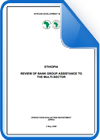Evaluation Team
The Report was prepared by Mr. F. TURAY, Principal Post Evaluation Officer, Operations Evaluation Department (OPEV), and Prof. O. O. OJO, Consultant, following their mission to Ethiopia in September 2005.
Objective
The purpose of this report is to evaluate Bank’s assistance to the multi-sector in Ethiopia for the period 1992-2004; with a view to establishing the extent to which Bank’s lending programme in support of the multi-sector in Ethiopia was effective in achieving the overall goal of economic growth and poverty reduction1. The study will also draw lessons of experience from the evaluation that could make future Bank assistance in this area more effective.
Main Findings
- Bank intervention in the multi-sector in Ethiopia started with the cessation of hostilities in 1991. All the three completed projects that are herein evaluated were well designed with strong emphasis on economic rehabilitation, stabilization, structural reforms, growth and poverty reduction. The implementation of the projects was also good with the government showing strong ownership and commitment. The economy’s response was a critical factor in the outcome of the projects. Some progress has also been recorded in the area of poverty reduction with the HDI showing progressive, albeit, marginal improvements. Compared to pre-programme era, the economy has been substantially liberalized with market forces playing a key role in the allocation of resources.
- There are however a few areas of concern. All the completed projects were implemented with delays and on-going projects in the sector have started to experience similarly long implementation problems. The implementation delays were mainly due to the relatively inflexible Bank procurement rules and procedures, and limited implementation of project executing agency combined with their limited knowledge of the procurement procedures. Although the economy is liberalized, the private sector has not grown much partly because of the slow progress in privatization and partly because of the existence of some party-controlled enterprises which are competing unfavourably with private operators. Financial intermediation remains low as the Commercial Bank of Ethiopia (a government-owned enterprise) retains monopoly power (in terms of size of deposits) and an indirect influence over interest rates and exchange rate in the financial system. In-spite of measures contained in the projects aimed at diversification of the economy, the economy remains rooted in its dependence on rural agriculture, with minimal increase in the value added of the industrial sector. Finally the economy continues to rely on foreign resources for a large part of its development finance. But the recent introduction of the VAT a major source of revenue promises to enhance domestic resource mobilization and thereby reduce, to some extent, Ethiopia’s dependence on foreign resources.
Main Lessons
- One major factor in the success of the three completed projects –ERRP, SAP-I and SAPII is government ownership of the programmes and the political will to reform. Even though it sought technical assistance in the preparation of the programmes, the government demonstrated ownership of the programmes. In addition, it was able to line other stakeholders in the economy behind the programmes.
- Another lesson is that availability of funding tends to lessen the pains of adjustment and therefore make policy reversal unlikely. This is the so-called complementarity between financing and adjustment, which postulates that when financing is inadequate or irregular, adjustment tends to be painful. Under this condition, policy reversal is likely as a result of social outcry against a painful adjustment process. In the case of Ethiopia the donors were always ready to provide the funding as the government did not falter on its commitment to the programmes.
- Effective donor coordination is crucial to the success of adjustment programmes. By coordinating their policies, they reduce the transaction costs of the delivery of their interventions. Coordination also ensures joint surveillance over agreed targets. The DBS in particular has this twin advantage over conventional adjustment programmes.
- The performance of the Ethiopian economy has always been determined by the availability of rains. The high dependence on rain-fed agriculture leaves the economy to the vagaries of weather. In order to be able to manage the economy in a more predictable fashion there is need to reduce the economy’s dependence on availability of rains.
Main Recommendations
Recommendations to the Beneficiary:
- The performance of the Ethiopian economy has always been determined by the availability of rains. The high dependence on rain-fed agriculture leaves the economy to the vagaries of weather. In order to be able to manage the economy in a more predictable fashion there is need to reduce the economy’s dependence on availability of rains.
- As it is well known, political stability is a precondition for economic growth. The government should ensure that peace is guaranteed as its absence could derail any reform programme as has been observed with the border war with Eritrea.
Recommendations to the Bank:
- The Bank must improve on its performance through timely implementation of projects/programmes and it must commit itself to timely preparation of PCRs once a project is completed. The field offices must be strong enough to be able to take decisions without having to refer all issues to the headquarters. The Bank must also assist in developing the capacity of the MCD and the PIUs of other ministries to carry out monitoring and evaluation of projects and in particular, in the preparation of PCRs.
- The Bank has worked well with other donors in Ethiopia. It should continue and indeed strengthen this partnership particularly now that is has become part of the DBS Joint Team.
File(s):
| Attachment | Size |
|---|---|
| 244.75 KB |


